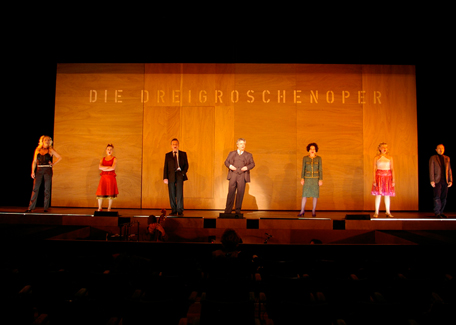DIRECTOR
> THEATRE | MUSICAL THEATRE | OPERA | SPECIAL PROJECTS
La ópera de tres centavos / Die Dreigroschenoper
(2010)
Convened by the Nationaltheater Mannheim, Germany -opens on February 27th, 2010- a version of Die Dreigroschenoper (The Threepenny Opera) by Kurt Weill and Bertolt Brecht with the musical direction of Joe Völker. The peculiarity of this production is that it is the first time an Argentine director assembles this xx century popular classic to the German audience.
Music in Die Dreigroschenoper drives me to a question: why did Brecht & Weill decide to do a play with music? There could be thousands of answers to this question, but for me this conducts myself into one way of “reading” the text. The play has a partition (every play has it) but those that are including music in their language have –for me- a much more clear idea of rhythm. There are different levels of understanding rhythm on a stage. Die Dreigroschenoper is constructed in a very close relation between words and music. Even if the songs are not “fitting” with the scene. The way of dealing with the songs (concerning the acting) has two paths for me: a formal way (supported by a distance between text and emotion, music and lyric, feelings and body language) and a “content” way (nearly the opposite of the other one –empathy between body language and feelings, etc.): epic and drama (to summarize it).
The way of acting text is not split from the way to act singing.
There could be moments of dramatic singing (Melodrama, Jealousy duet), moments of epic singing (Salomon Song, 2 Finale) and there could be some moments where those two ways are strongly connected (Seeräuber Jenny, 1 Finale).
I think that there is no need of acting poorly outside the songs. When music “arrives” to stage everything changes immediately, there is no choice of avoiding it. What we can do is to underline or not this change. If we use a musical bridge (instrumental music beginning 60 or 90 seconds before the song starts) the clash will not be so evident and we will be conducting smoothly the audience into the song. If we decide to attack the song abruptly after one text this will construct another perception of it.
What I feel about the music in this play is that is a real war between Brecht and Weill and this is something I always feel when I see a production of Die Dreigroschenoper. The challenge will be to show the war (clash) but not to decide a winner. We will succeed if we can balance music & text. For that reason it seems to be really important the cuts of Brecht’s text in order not to have a “boring” scene and a “funny” song.
Songs has not to be a relief in the performance.
Do we have to believe in music? As far as we believe in text. Not more, not less. This is the other challenge for me. And it is extremely linked with the way we will handle text and music relation in the whole play.
Alejandro Tantanian
-
The threepenny Opera / Die Dreigroschenoper
- A play with music in one prologue and eight scenes by Bertolt Brecht based in “The Beggar’s Opera” by John Gay translated by Elisabeth Hauptmann with music by Kurt Weill
- with
Mackie Messer
Michael Fuchs- Mister Peachum
Rainhard Mahlberg - Misses Peachum
Ragna Pitoll - Polly Peachum
Dasha Trautwein
Jenny
Saskia Deforth
-
Lucy Brown
Jenny König -
Tiger Brown
Ralf Dittrich -
Münzmatthias, Konstabler Smith, Hure
Thorsten Danner -
Hakenfingerjakob, Konstabler Smith, Hure
Peter Pearce -
Sägerobert, Konstabler Smith, Hure
Andreas Krüger -
Orchestra
Bernd Ballreich
Martin Förster
Ralf Himmler
Jochen Welsch
Jörg Teichert
Katharina Gross
Cristiane Gavazzoni
Joe Völker -
Stage Manager
Christian Karl Marx -
Costume assistant
Anke Niehammer -
Set Assistant
Linda Johnke
-
Assistant direction
Torge Kübler -
Lights
Wolfgang Schade
-
Choreography
Diego Velázquez -
Dramaturgy
Jan-Philipp Possmann
-
Set and costume
Oria Puppo
-
Musical direction
Joe Völker- Direction
Alejandro Tantanian - Running time: 150 minutes with one pause.
Premiere: February 27th, 2010, Schauspielhaus, Nationaltheater Mannheim, Germany
Further presentations:
Seasons 2011, 2012, 2013 and 2014 at the same theatre. - Direction
